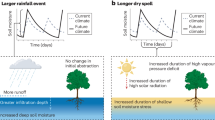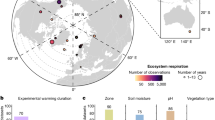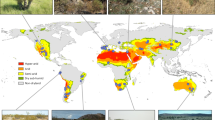Abstract
Soils store two or three times more carbon than exists in the atmosphere as CO2, and it is thought that the temperature sensitivity of decomposing organic matter in soil partly determines how much carbon will be transferred to the atmosphere as a result of global warming1. Giardina and Ryan2 have questioned whether turnover times of soil carbon depend on temperature, however, on the basis of experiments involving isotope analysis and laboratory incubation of soils. We believe that their conclusions are undermined by methodological factors and also by their turnover times being estimated on the assumption that soil carbon exists as a single homogeneous pool, which can mask the dynamics of a smaller, temperature-dependent soil-carbon fraction. The real issue about release of carbon from soils to the atmosphere, however, is how temperature, soil water content and other factors interact to influence decomposition of soil organic matter. And, contrary to one interpretation3 of Giardina and Ryan's results, we believe that positive feedback to global warming is still a concern.
This is a preview of subscription content, access via your institution
Access options
Subscribe to this journal
Receive 51 print issues and online access
$199.00 per year
only $3.90 per issue
Buy this article
- Purchase on Springer Link
- Instant access to full article PDF
Prices may be subject to local taxes which are calculated during checkout

Similar content being viewed by others
References
Kirchbaum, M. U. F. Biogeochemistry 48, 21–51 (2000).
Giardina, C. P. & Ryan, M. G. Nature 404, 858–861 (2000).
Grace, J. & Rayment, M. Nature 404, 819–820 (2000).
Jenny, H. Factors of Soil Formation (McGraw-Hill, New York, 1941 ).
Post, W. M., Emanuel, R., Zinke, P. J. & Stangenberger, A. G. Nature 298, 156–159 ( 1982).
Raich, J. W. & Schlesinger, W. H. Tellus 44B, 81–99 (1992).
Lavelle, P. et al. Biotropica 25, 130– 150 (1993).
Davidson, E. A. & Ackerman, I. L. Biogeochemistry 20, 161–193 ( 1993).
Tiessen, H., Cuevas, E. & Chacon, P. Nature 371, 783– 785 (1994).
Neill, C. & Davidson, E.A. in Carbon Pools and Dynamics in Tropical Ecosystems (eds Lal, R., Kimble, J. M. & Stewart, B. A.) 197–211 (CRC, Boca Raton, 2000).
Trumbore, S. E. Ecol. Appl. 10, 399–411 (2000).
Trumbore, S., Chadwick, O. A. & Amundson, R. A. Science 272, 393– 396 (1996).
Holland, E. A., Townsend, A. R. & Vitousek, P. M. Glob. Change Biol. 1, 115– 123 (1995).
Valentini, R. et al. Nature 404, 861–865 (2000).
Goulden, M. L. et al. Science 279, 214–217 (1998).
Author information
Authors and Affiliations
Rights and permissions
About this article
Cite this article
Davidson, E., Trumbore, S. & Amundson, R. Soil warming and organic carbon content . Nature 408, 789–790 (2000). https://doi.org/10.1038/35048672
Issue Date:
DOI: https://doi.org/10.1038/35048672
This article is cited by
-
Soil organic carbon stocks in native forest of Argentina: a useful surrogate for mitigation and conservation planning under climate variability
Ecological Processes (2024)
-
Soil organic carbon is a key determinant of CH4 sink in global forest soils
Nature Communications (2023)
-
Carbon accumulation in soil layers under degraded, intact and planted forest cover types in tropical semi-deciduous and moist evergreen forests
New Forests (2023)
-
Quantifying the Respiratory Pattern of Rhizosphere Microbial Communities in Healthy and Diseased Tomato Plants Using Carbon Substrates
Journal of Soil Science and Plant Nutrition (2023)
-
Carbon sink and source function of Eastern Himalayan forests: implications of change in climate and biotic variables
Environmental Monitoring and Assessment (2023)
Comments
By submitting a comment you agree to abide by our Terms and Community Guidelines. If you find something abusive or that does not comply with our terms or guidelines please flag it as inappropriate.



